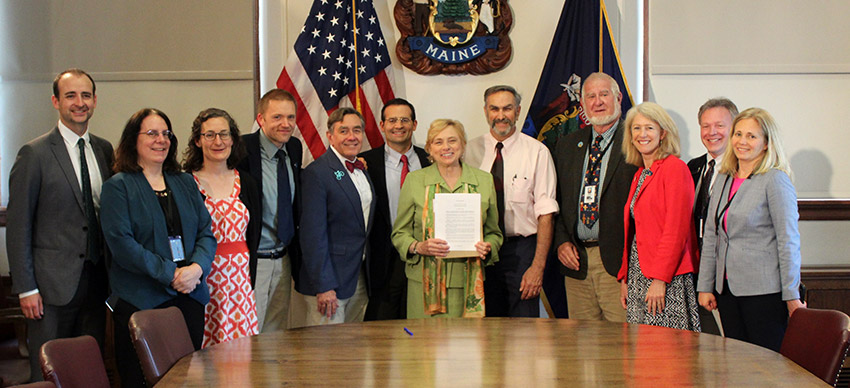As part of effort, Mills Administration plans to participate in Federal Task Force
Governor Janet Mills today signed into law LD 994, legislation that requires the Public Utilities Commission to approve the contract for Maine Aqua Ventus, the first of its kind demonstration project of floating offshore wind in the United States.
“With the innovative work being done at University of Maine, our state has the potential to lead the world in floating offshore wind development,” said Governor Mills. “This long-overdue bill will move us in that direction.”
“The University of Maine has become a national leader in research and development around wind power, composite materials, and other important areas,” said Senator David Woodsome, the Republican sponsor of the legislation. “The Aqua Ventus program is one more area where Maine can take the lead in the kind of research that could yield results that impact the World.”

Governor Mills also announced today that the State of Maine has accepted an invitation from the Bureau of Ocean Energy Management (BOEM) to participate in a federally-led Gulf of Maine Intergovernmental Regional Task Force on offshore wind with New Hampshire and Massachusetts. The Task Force, which involves governmental agencies, will seek to identify potential opportunities for renewable energy leasing and development on the Outer Continental Shelf in the Gulf of Maine.
Additionally, Governor Mills announced that this summer she will direct the creation of the Maine Offshore Wind Initiative, a state-based initiative to identify opportunities for offshore wind development in the Gulf of Maine and to determine how Maine can best position itself to benefit from future offshore wind projects, including opportunities for job creation, supply chain and port development, and offshore wind’s impact on Maine’s energy future. Importantly, the Initiative will also be charged with promoting compatibility between potential future uses and existing uses in the Gulf of Maine to inform offshore wind siting considerations and minimize any impact on Maine’s commercial fishing and maritime industries.
“Offshore wind represents a great opportunity for Maine’s energy future and our economy. The development of offshore wind technology in Maine will create jobs, help us meet our energy needs with our own resources, and reduce carbon emissions in the process. The Maine Offshore Wind Initiative will lead this work,” Governor Mills continued. “Participating in the federal task force will also give Maine a seat at the table to ensure that development moves forward with the least impact to commercial fishing and other ocean-dependent industries.”
While the Maine Offshore Wind Initiative will be led by and include state agencies, it will also solicit the participation of local officials, Maine tribal representatives, marine interests, commercial fishing, energy and environmental organizations, academics, scientists, business and labor. For state agencies, the Initiative will include officials from the Governor’s Energy Office, Office of Policy Innovation and the Future, Department of Economic and Community Development and the state’s natural resource agencies, including the Department of Environmental Protection and the Department of Marine Resources. The Initiative will provide valuable input and inform the state’s participation in the BOEM Task Force.
The Maine Aqua Ventus pilot project, supported by $39.9 million in grant funds from the U.S. Department of Energy, will deploy floating turbines, designed by the University of Maine, off the coast of Maine. The floating platforms and other components will be assembled in Maine and, once installed, will provide clean energy to Maine and will provide a valuable demonstration for future development in Maine and elsewhere.
In 2009, an Ocean Energy Task Force released a report that identified significant offshore wind resources off the coast of Maine. The new Initiative will utilize this work as a foundation for continued planning efforts. Federal jurisdiction begins three miles beyond the coast.
Read the Bureau of Ocean Energy Management (BOEM) letter inviting the State of Maine to participate in the Gulf of Maine Intergovernmental Regional Task Force (PDF) and Governor Mills’ letter of acceptance (PDF).